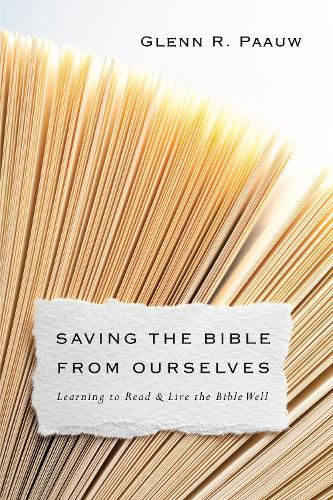Readings Newsletter
Become a Readings Member to make your shopping experience even easier.
Sign in or sign up for free!
You’re not far away from qualifying for FREE standard shipping within Australia
You’ve qualified for FREE standard shipping within Australia
The cart is loading…






This title is printed to order. This book may have been self-published. If so, we cannot guarantee the quality of the content. In the main most books will have gone through the editing process however some may not. We therefore suggest that you be aware of this before ordering this book. If in doubt check either the author or publisher’s details as we are unable to accept any returns unless they are faulty. Please contact us if you have any questions.
ECPA 2017 Christian Book Award Finalist
Does the Bible need to be saved? Over the course of the centuries, Bible scholars and publishers have increasingly added helps -chapter divisions, verses, subheads, notes-to the Bible in an effort to make it easier to study and understand. In the process, however, these have led to sampling Scripture rather than reading deeply.
According to author Glenn R. Paauw, the text has become divorced from the Bible’s literary and historical context, leading to misinterpretation and a narrow, individualistic and escapist view of salvation. Rather than being a culture-shaping force, the Bible has become a database of quick and easy answers to life’s troubling questions. But these deficiencies can be corrected by engaging in what the author calls big readings.
In these pages Paauw introduces us to seven new (to us) understandings of the Bible as steps on the path to recovering one deeply engaged Bible. With each new Bible presented, deficiencies in how we currently interact with the Bible are explored, followed by recommendations for a new practice. The Bible’s transformative power is recovered when we remove the chains Christians have applied to it over the centuries.
The Bible does not need to be saved because of any defect in itself, but because we have distorted and misread it. Saving the Bible from Ourselves provides students of the Bible a new paradigm for reading and living the Bible well.
$9.00 standard shipping within Australia
FREE standard shipping within Australia for orders over $100.00
Express & International shipping calculated at checkout
This title is printed to order. This book may have been self-published. If so, we cannot guarantee the quality of the content. In the main most books will have gone through the editing process however some may not. We therefore suggest that you be aware of this before ordering this book. If in doubt check either the author or publisher’s details as we are unable to accept any returns unless they are faulty. Please contact us if you have any questions.
ECPA 2017 Christian Book Award Finalist
Does the Bible need to be saved? Over the course of the centuries, Bible scholars and publishers have increasingly added helps -chapter divisions, verses, subheads, notes-to the Bible in an effort to make it easier to study and understand. In the process, however, these have led to sampling Scripture rather than reading deeply.
According to author Glenn R. Paauw, the text has become divorced from the Bible’s literary and historical context, leading to misinterpretation and a narrow, individualistic and escapist view of salvation. Rather than being a culture-shaping force, the Bible has become a database of quick and easy answers to life’s troubling questions. But these deficiencies can be corrected by engaging in what the author calls big readings.
In these pages Paauw introduces us to seven new (to us) understandings of the Bible as steps on the path to recovering one deeply engaged Bible. With each new Bible presented, deficiencies in how we currently interact with the Bible are explored, followed by recommendations for a new practice. The Bible’s transformative power is recovered when we remove the chains Christians have applied to it over the centuries.
The Bible does not need to be saved because of any defect in itself, but because we have distorted and misread it. Saving the Bible from Ourselves provides students of the Bible a new paradigm for reading and living the Bible well.